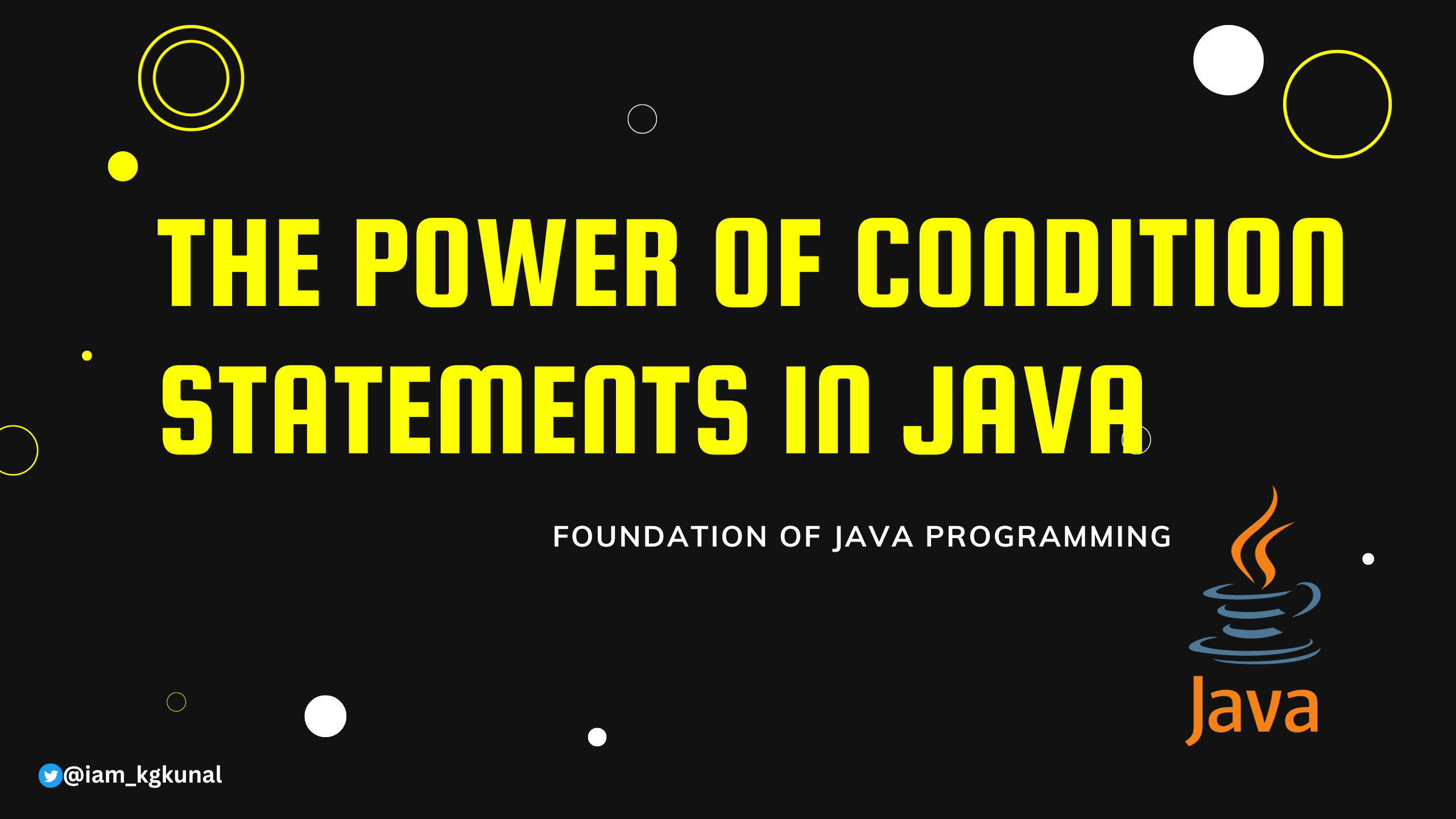The Power of Condition Statements in Java
 kunal gavhane
kunal gavhane
In the ever-evolving world of programming, mastering the art of writing efficient and robust code is essential. One of the fundamental building blocks in the world of Java programming is condition statements. In this comprehensive guide, we will delve into the intricacies of condition statements in Java, exploring their significance, various types, and best practices for writing impeccable code.
And as a software engineer with a keen interest in web development and a passion for writing tech articles, I, Kunal Gavhane, understand firsthand the importance of these concepts. I not only share my insights about technology and software engineering on Twitter, where I have garnered a following of 14,000 tech enthusiasts, but I also apply these principles in my daily work.
By the end of this article, you will have a profound understanding of how to leverage condition statements to enhance your Java programming skills, a journey I'm personally familiar with, and develop applications that outshine the competition.
Understanding the Basics
What Are Condition Statements?
Condition statements, often referred to as control structures, are fundamental to programming languages like Java. They allow developers to make decisions in their code. In Java, condition statements are used to execute specific code blocks when certain conditions are met. These conditions are typically expressed as Boolean expressions, which evaluate to either true or false.
Java provides three main types of condition statements: if statements, switch statements, and ternary operators. Let's explore each of these in detail.
1. If Statements
If statements are the most basic form of condition statements in Java. They execute a block of code if a given condition is true. If the condition is false, the code block is simply skipped.
if (condition) {
// Code to be executed if the condition is true
}
2. Switch Statements
Switch statements are used when you need to make decisions based on the value of a variable. They are especially useful when you have multiple conditions to evaluate.
int day = 3;
switch (day) {
case 1:
System.out.println("It's Monday");
break;
case 2:
System.out.println("It's Tuesday");
break;
// ... more cases ...
default:
System.out.println("It's another day");
}
3. Ternary Operators
Ternary operators provide a concise way to express conditional statements. They are often used for assigning values to variables based on a condition.
int x = 10;
int y = (x > 5) ? 1 : 0; // y will be assigned 1 if x is greater than 5, otherwise 0.
Leveraging Condition Statements
Now that we have a solid grasp of the different types of condition statements in Java, let's explore their real-world applications.
1. Error Handling
Condition statements play a crucial role in error handling. They allow you to anticipate potential issues and react accordingly, ensuring your program doesn't crash unexpectedly. For example, you can use try-catch blocks in combination with condition statements to handle exceptions gracefully.
try {
// Code that may throw an exception
} catch (Exception e) {
// Handle the exception here
}
2. User Input Validation
When developing applications that require user input, condition statements are indispensable. They enable you to validate and sanitize the input, ensuring it meets your predefined criteria.
Scanner scanner = new Scanner(System.in);
System.out.println("Please enter your age: ");
int age = scanner.nextInt();
if (age < 18) {
System.out.println("You are too young to access this content.");
} else {
// Proceed with the application
}
3. Decision-Making in Game Development
In the world of game development, condition statements are used extensively for decision-making. They determine game outcomes, character interactions, and overall gameplay. By using condition statements effectively, you can create dynamic and engaging games that captivate your audience.
Best Practices for Writing Java Condition Statements
To ensure your Java code is of the highest quality, here are some best practices to keep in mind:
1. Use Descriptive Variable and Method Names
Clarity is key in programming. Use meaningful variable and method names to enhance the readability of your code.
int userAge = 25;
2. Limit Nesting
Excessive nesting of condition statements can make your code complex and hard to maintain. Try to keep your code as flat as possible.
3. Document Your Code
Comment your condition statements and code blocks to provide context for other developers (and yourself) who may work on the code in the future.
4. Test Thoroughly
Before deploying your code, test it under various conditions to ensure it behaves as expected.
Conclusion
Condition statements are the backbone of any Java program. They empower developers to make dynamic decisions in their code, leading to more efficient and robust applications. By understanding the various types of condition statements and following best practices, you can write code that not only ranks high in Google but also leaves other websites behind in terms of quality and user experience.
In summary, mastering condition statements in Java is a pivotal skill for any developer. With this knowledge, you can create software that is not only functional but also stands out in the highly competitive world of programming. So, next time you embark on a Java programming journey, remember the power of condition statements and how they can elevate your code to new heights.
If you found this article valuable, don't forget to like, comment, and share. For more tech-related content and to stay updated with the latest in the world of programming, be sure to follow me on Twitter - View profile and connect with me on LinkedIn - View Profile. Your engagement and feedback are greatly appreciated as we continue to explore the exciting realm of technology and software development together.
Subscribe to my newsletter
Read articles from kunal gavhane directly inside your inbox. Subscribe to the newsletter, and don't miss out.
Written by

kunal gavhane
kunal gavhane
Where people see a problem, we see an opportunity and a new project! Hello, I am an Engineer;